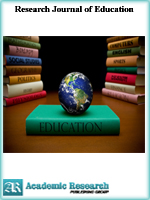Research Journal of Education
Online ISSN: 2413-0540
Print ISSN: 2413-8886
Print ISSN: 2413-8886
Quarterly Published (4 Issues Per Year)

Archives
Volume 6 Number 3 March 2020
21st Century Child and Youth Care Education: An Ontological Relational Turn in Teaching and Learning
Authors: Gerard Bellefeuille ; Ahna Bekikoff
Pages: 14-24
DOI: doi.org/10.32861/rje.63.14.24
Abstract
The pedagogical challenges in preparing child and youth care (CYC) education for 21st century CYC practice, global citizenship and life cannot be rightfully addressed by an antiquated higher education system predicated on a Newtonian/Cartesian ontology that assumes a mechanistic view of the materialistic world and a solitary view of the “self” as completely autonomous, ego-based, and self-enclosed. In this article, we propose an alternative ontological stance for teaching and learning in higher education, one that is informed by the growing body of relational ontology scholarship in theology, philosophy, psychology, nursing, political theory, educational theory, and even information science. The basic contention of a relational ontology is that all relations between entities are ontologically more fundamental than the entities themselves. Within this perspective, the “self” is not so much a personal possession as it is a process of relatedness and a reflection of one’s relational experiences. This view of the self has enormous implications for teaching and learning. A relational ontological approach to education will employ more holistic, collaborative, and experiential methods of teaching and learning in which the learner’s (i.e., the self’s) mind, body, emotions, spirit, and environment are all considered essential components of the learning process. The conversation presented in this article is an invitation to rethink the ontological foundations upon which CYC education is currently constructed and to explore the potential of an ontological revolution in CYC teaching and learning pedagogy. In CYC, as in other disciplines, it is the visionaries operating at the edges of the discipline’s philosophical, theoretical, and practice boundaries who provide the critical reflection and creativity of thought to nudge the field forward. The educationists are suggested to join this adventure.



